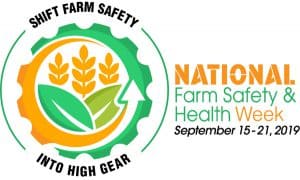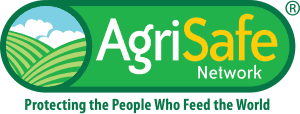National Farm Safety and Health Week 2019
Shift Farm Safety into High Gear
September 15-21, 2019
#FarmSafety #NFSHW

America’s farmers provide us with an abundant food supply. But farmers are exposed to a unique, sometimes hazardous workplace. Agriculture continues to rank as one of the most dangerous occupations in North America and across the globe.
National Farm Safety and Health Week is September 15-21, 2019. This year’s theme is “Shift Farm Safety into High Gear”.
The National Education Center for Agricultural Safety (NECAS), UMASH, and the US Agricultural Centers funded by the National Institute for Occupational Safety and Health (NIOSH) are spotlighting agricultural health and safety with a variety of resources for farm workers, their families, and everyone involved in agriculture.
DAILY THEMES
| MONDAY | Tractor Safety & Rural Roadway Safety |
| TUESDAY | Farmer Health & Opioid/Suicide Prevention |
| WEDNESDAY | Safety & Health for Youth in Agriculture |
| THURSDAY | Confined Spaces in Agriculture |
| FRIDAY | Safety & Health for Women in Agriculture |
WEBINAR TOPICS:
- Understanding the Tractor Factor
Aaron Yoder, PhD
Associate Professor, University of Nebraska Medical Center - Ergonomic Safety for Farm Women
Charlotte Halverson, RN, BSN, COHN-SClinical Director, AgriSafe Network - A Research Update from the Agricultural Health Study: Recent Findings, Current Work, and Future Plans
Christine G. Parks, MSPH, PhD
Staff Scientist, Epidemiology Branch National Institute of Environmental Health Studies - Safety Sensitivity of Opioid Use in High Hazardous Industries Such as Agriculture
Heather Lyons-Burney, Pharm.D
Clinical Assistant Professor, Division of Pharmacy Practice and Administration, UMKC School of Pharmacy at MSUAnn Marie Butler Kemp, MD
Professor and Associate Director Family Medicine Residency Program, Associate Professor Clinical Pharmacy, USCIS Civil Surgeon, University of Mississippi Medical CenterCharlotte Halverson, RN, COHN-S
Clinical Director, AgriSafe Network - Safeguarding Children and Youth who Live, Work and Play on Farms and Ranches
Melissa Ploeckelman
Outreach Specialist, National Children’s Center for Rural and Agricultural Health and Safety - Exploring the Invest in Your Health Trainer Exchange
Natalie Roy, MPH
Executive Director, AgriSafe Network - Hazard Communication Standards
Dan Neenan, MBA
Paramedic, Director, National Education Center for Agricultural Safety - Reducing the Risk of Adverse Pregnancy Outcomes and Perinatal Illness for Female Agricultural Producers
Knesha Rose-Davison, MPH
Communications Director, AgriSafe Network
RESOURCES
NFSHW Promotional Materials
- 2019 NFSHW Logo (color) (grayscale)
- 2019 NFSHW Save the Date Card
- NECAS 2019 NFSHW Press Release (pdf)
- UMASH Press Release
- Farm Safety and Health Week PSA (wav) (mp3)
UMASH Ag Safety Resources
- UMASH Farm Safety Check
The UMASH Farm Safety Check is a quick monthly review to identify and fix potential hazards before they cause harm to your family and employees – and your bottom line. Each month, Farm Safety Check will focus on a different topic, offering checklists and tips to help identify hazards, along with resources to remedy any problems.
- UMASH Resource Database
Download agricultural safety and health resources created by UMASH, our pilot project programs, and collaborating institutions
- UMASH Ag Safety and Health Spotlight
The UMASH Ag Health and Safety Spotlight features stories from farmers and farm families about their experiences with injury or illness on the farm as well as stories that highlight new resources and organizations that are working to improve agricultural safety and health.
- Agricultural Education Teacher Resources
Teaching agricultural safety and health is an important topic for the next generation of farmers and related agriculture professions. UMASH has compiled materials that ag educators can use to highlight agricultural safety and health in the classroom, including lesson plans, resources on a variety of health and safety topics, awareness events, planning tools, and tips on how to use the material in the classroom.
NIOSH Agricultural Safety and Health Centers
The Centers for Agricultural Disease and Injury Research, Education, and Prevention represent a major NIOSH effort to protect the health and safety of agricultural workers and their families. The Centers were established by cooperative agreement to conduct research, education, and prevention projects to address the nation’s pressing agricultural health and safety problems. Geographically, the Centers are distributed throughout the nation to be responsive to the agricultural health and safety issues unique to the different regions.
US Ag Centers YouTube Channel
The US Agricultural Centers funded by the National Institute for Occupational Safety and Health offer online safety videos through a special YouTube channel. These safety videos are designed for producers, Extension agents, first responders and farm families. The videos can be especially relevant during harvest season, as farmers are putting in long hours under the stress of weather delays and equipment breakdowns.
National Education Center for Agricultural Safety (NECAS)
The National Education Center for Agricultural Safety (NECAS) is dedicated to preventing illnesses, injuries, and deaths among farmers and ranchers, agricultural and horticultural workers, their families, and their employees. NECAS is a partnership with the National Safety Council and Northeast Iowa Community College (NICC) Peosta campus.
Links and Additional Resources
- eXtension.org
Resources and tools to help the Extension workforce increase local and national impact.
- FarmAnswers.org
USDA-NIFA beginning farmer and rancher (BFRDP) clearinghouse, providing resources to help you get started farming, as well as tools to help more seasoned producers succeed.
- Farm MAPPER
A pre-plan map of farms to expedite response times in emergencies.
- SaferFarm
A hazard analysis tool recommending abatement of common farm hazards.
- Safety in Agriculture for Youth (SAY) National Clearinghouse
Safety in Agriculture for Youth (SAY) is a national clearinghouse that provides two types of materials: formal, educational curriculum and resources that support Agriculture, Food, and Natural Resources (AFNR) guidelines for classroom instruction.

